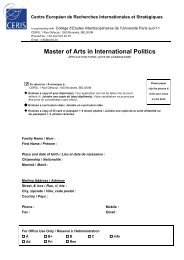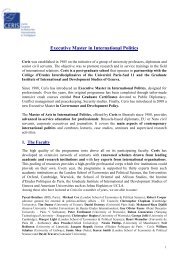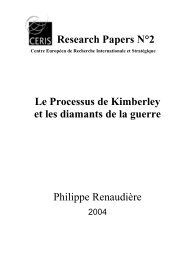hydropolitics of the tigris - euphrates river basin with - ceris.be
hydropolitics of the tigris - euphrates river basin with - ceris.be
hydropolitics of the tigris - euphrates river basin with - ceris.be
Create successful ePaper yourself
Turn your PDF publications into a flip-book with our unique Google optimized e-Paper software.
ombings <strong>of</strong> water storage dams and HEP (hydro-electric power) dams have resulted in extensive damage <strong>of</strong><br />
water infrastructures such as purification plants and power stations. 41 Presently in Iraq <strong>the</strong> issue <strong>of</strong> food<br />
shortages are <strong>be</strong>ing dealt <strong>with</strong> by importation and assistance from <strong>the</strong> International community (though not<br />
effectively) and many areas are still severely plagued by <strong>the</strong> lack <strong>of</strong> drinking water and electricity as a<br />
consequence <strong>of</strong> <strong>the</strong> war.<br />
Hydropolitics and Hydrological Impacts on Regional Security<br />
As infrastructural developments on <strong>the</strong> Tigris and Euphrates <strong>be</strong>gan to ga<strong>the</strong>r pace, especially in Turkey, <strong>the</strong>y<br />
triggered a series <strong>of</strong> incidents that did not erupt into <strong>the</strong> much-prophesied ‘water wars’ but certainly<br />
exacerbated <strong>the</strong> security situation <strong>be</strong>tween all <strong>of</strong> <strong>the</strong> riparian states. They will <strong>be</strong> reviewed here in <strong>the</strong> order<br />
reflecting countries whose trans-boundary water management practices first spilled into <strong>the</strong> security arena.<br />
We <strong>be</strong>gin, not surprisingly, upstream.<br />
Turkey’s Keban Dam and Syria’s Lake Assad<br />
The construction <strong>of</strong> <strong>the</strong> Keban Dam in <strong>the</strong> 1960’s provided <strong>the</strong> first sign <strong>of</strong> regional security stress linked to<br />
water. After discussions <strong>with</strong> Syria, Turkey had agreed to release 350m 3 /s <strong>of</strong> Euphrates water to Syria but<br />
<strong>the</strong>re were complaints from Iraq that this was insufficient. When Turkey and Syria <strong>be</strong>gan to impound water<br />
for eventually filling both <strong>the</strong> Keban and <strong>the</strong> Tabqa Dams in 1974-5, Iraq put up strong enough protest that it<br />
resulted in Turkey’s application for funding to <strong>the</strong> World Bank <strong>be</strong>ing conditional to a release a minimum <strong>of</strong><br />
450m 3 /s. 42 It did not stop <strong>the</strong>re. Iraq focussed <strong>the</strong>ir hostilities on Syria; not only <strong>be</strong>cause <strong>of</strong> <strong>the</strong> sharp<br />
reduction <strong>of</strong> flow from <strong>the</strong> Euphrates from <strong>the</strong> Tabqa Dam that Iraq <strong>be</strong>lieved was <strong>the</strong>irs by right, but also<br />
<strong>be</strong>cause <strong>of</strong> <strong>the</strong> growing enmity <strong>be</strong>tween <strong>the</strong> two Ba’athist regimes. 43<br />
The dispute reached crisis proportions and in March and April <strong>of</strong> 1975 both Iraq and Syria mobilised troops<br />
along <strong>the</strong>ir common borders and closed each o<strong>the</strong>r’s airspaces. It required Soviet and Saudi intervention to<br />
mediate <strong>the</strong> situation and Syria finally agreed to release more water. 44<br />
Turkey and <strong>the</strong> Attaturk Reservoir<br />
20





